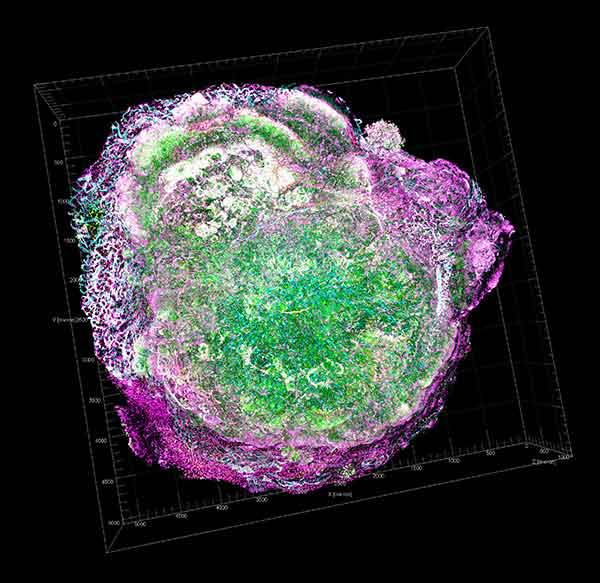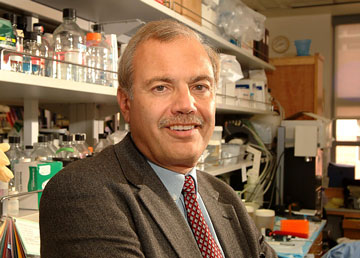
HER2’s Genetic Link to Breast Cancer Spurs Development of New Treatments
When NCI-supported researchers discovered that the HER2 gene is important for breast cancer growth, this led to the development of the drug trastuzumab and other targeted treatments that have improved survival for women with HER2-positive breast cancer.
Exploring Why Some Cancers Grow and Spread and Others Don’t
For years, doctors and researchers have noted that not all cancers are alike. Some patients’ tumors grow quite slowly and never spread beyond the site where they first formed. But for other patients, their tumors grow rapidly and spread like wildfire.
In the early 1980s, after the discovery that a mutated gene called HER2 could stimulate excessive cell growth and division, many scientists wondered if certain genes might make cancers grow and spread rapidly. Researchers around the world began searching for genes that spur cancer growth.
Blocking HER2 Slows or Stops Some Types of Breast Cancer
NCI-funded researcher Dennis Slamon, M.D., was among the many scientists searching for genes that can lead to cancer. In 1987, he and his colleagues discovered that the growth factor receptor gene HER2, which produces HER2 proteins, might be a good candidate.
At the same time, a team of NCI researchers led by Stuart Aaronson, M.D., were among the first to show that the HER2 protein could cause normal cells to grow uncontrollably like aggressive cancer cells.
Dr. Slamon’s team found that the HER2 protein is present at high levels (HER2 positive) in about 30 percent of breast cancers. They also discovered that high levels of HER2 are linked to a greater likelihood of metastasis and relapse and an overall decrease in patient survival. The group concluded that HER2 might play a role in the development and growth of breast cancer.
This led researchers to a groundbreaking hypothesis: If HER2 could be blocked, the growth of HER2-positive breast cancer might be slowed.
One way to block the action of a protein is to use laboratory-made monoclonal antibodies that attach to a specific protein and disrupt its function. With NCI support, Dr. Slamon and colleagues from the University of Texas Health Sciences Center had a breakthrough. They showed that an antibody specific to HER2 could slow the growth of metastatic breast cancer cells and other types of cancer in a laboratory dish.
A collaboration between Genentech and UCLA researchers subsequently showed that HER2-specific antibodies could suppress the growth of HER2-positive tumors in mice.
Researchers at Genentech then modified and developed a HER2-specific antibody, called trastuzumab (Herceptin), for use in humans.
Trastuzumab Targets Breast Cancer in Clinical Trials
Researchers launched three clinical trials of trastuzumab in the mid-1990s for patients with HER2-positive metastatic breast cancer. By 1998, the results of the phase 3 clinical trials showed that breast cancer in patients treated with trastuzumab and chemotherapy grew at a slower rate than in patients treated with chemotherapy alone. Subsequent clinical trials also showed positive outcomes among women with early-stage HER2-positive breast cancer.
On November 16, 2006, the US Food and Drug Administration (FDA) granted approval to trastuzumab used with chemotherapy as an adjuvant treatment for women with HER2-positive breast cancer. The drug has improved survival rates for women with stage 1 to 3 HER2-positive breast cancer by more than 30 percent.
HER2 protein is expressed at high levels in several other cancers besides breast cancer, and in 2010, FDA approved the use of trastuzumab in combination with the chemotherapy drug cisplatin and a type of cancer drug called a fluoropyrimidine to treat some patients with HER2-positive gastric or gastroesophageal junction cancers.
Researchers Develop Additional HER2-Targeted Treatments
Despite these successes, many women with breast cancer don’t benefit from current HER2-targeted treatments, or they become resistant to the effects of these drugs after initial treatment.
Therefore, researchers continue to test new or modified drug combinations. For example, in 2012, FDA approved pertuzumab (Perjeta) as a treatment for women with HER2-positive metastatic breast cancer to be used in combination with trastuzumab and docetaxel (Taxotere), a chemotherapy drug. In 2017, pertuzumab received approval for use in combination with the same drugs as an adjuvant treatment for patients with HER2-positive early breast cancer at high risk of recurrence. Pertuzumab works by blocking HER2 from sending signals to other proteins that cause cells to grow and replicate.
Other drugs that have been approved for treatment of HER2-positive breast cancer include ado-trastuzumab emtansine (Kadcyla), lapatinib ditosylate (Tykerb), and neratinib maleate (Nerlynx).
NCI continues to support research on developing HER2-targeted treatments that can treat a wide range of cancers, while also reducing harmful side effects and improving survival and quality of life.

























.png)









No hay comentarios:
Publicar un comentario